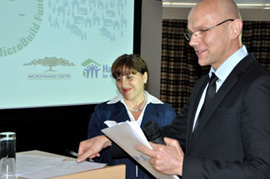Sharing our construction advice and expertise -- Habitat for Humanity Int'l 1
Sharing our construction advice and expertise
By Katerina Bezgachina
|
|

Habitat construction manager Oros Pavlo assisted with paperwork for a microloan from Habitat and HOPE International that enabled Vitaliiy Perets to renovate. Above: In May 2011, Habitat for Humanity and Microfinance Centre agreed to establish a Regional Center for Innovation for Shelter and Finance for Europe and Central Asia. Courtesy HFHI Global Programs.
|
|
|
|
Over the past few years, Habitat for Humanity has been striving to expand its impact in Europe and Central Asia by scaling up existing programs and making them sustainable.
One way to achieve sustainability is by using housing support services to train families on how to approach and deliver home improvements, and using technical assistance to train partner organizations in ways that will build their capacity to deliver housing support services.
In 2008, Habitat partnered with HOPE Ukraine, a microfinance organization, to offer affordable loans to families in need of improved living conditions. HOPE has been operating in Ukraine since 1997.
With their loans, families could start and grow small businesses such as transportation services, clothing shops and retail outlets.
But the high cost of renovations meant those families could not improve their homes, so HOPE decided to add housing loans to its portfolio and partnered with Habitat for Humanity.
The joint project was piloted in Transcarpathia, in the west of the country. HOPE reached out to the network of its existing clients, and Habitat offered expertise on how to design and deliver housing loans.
Habitat hired a construction project manager who could advise borrowers on what interventions were needed and the best way to implement them. Habitat’s construction and microfinance specialists held workshops for HOPE’s loan officers and construction managers to train them on how to estimate necessary construction works, put together budgets and select needed materials.
In fall 2010, a similar approach was taken in a new partnership in Bosnia and Herzegovina with Microcredit Foundation LOK. LOK had been providing microcredit to support entrepreneurship for several years, and had identified the need for housing microloans. Habitat helped the organization conduct market research and develop those microloans.
Reconstruction of the existing housing stock is the pressing problem in Bosnia and Herzegovina. The country was a part of the former Yugoslavia, and the civil wars of the 1990s destroyed almost half of its housing stock.
At the moment, LOK offers housing finance loans to low-income households in Bosnia and Herzegovina to carry out individual home repairs and energy efficiency upgrades. At a later stage, it plans to offer loans for residents of apartment blocks. Funds for the microloans were obtained though the Dutch International Guarantees for Housing Foundation. Habitat brings to the table construction advice and technical expertise.
In 2010, Habitat trained 52 loan officers to offer and manage home renovation loans. It also assisted the partner in hiring and orienting a construction manager. At the same time, Habitat developed manuals and guidelines on how to carry out basic repairs such as replacing windows, installing doors and laying floors, as many customers prefer to do this work themselves to save money on labor. These manuals can now be translated into other languages and offered to the families in Ukraine.
Microfinance has been hailed for offering real possibilities for fighting poverty in the developing world, where a stable financial system is absent. Affordable housing loans for basic repairs coupled with housing support services can solve the existing housing need, but the supply of such loans and services is still well below the demand.
“The importance of adequate housing tends to be overlooked among the development objectives,” said Loucine Hayes, regional housing finance manager at Habitat for Humanity Europe and Central Asia. “However, it is the basis to break the cycle of poverty for a family. To achieve this, we need affordable housing. Widespread housing microfinance can be seen as one of the solutions to the problem.”
At the end of May, Habitat for Humanity and the Microfinance Centre, a regional microfinance network working toward increased financial inclusion, signed a memorandum of understanding to establish a regional Center for Innovation in Shelter and Finance.
“This initiative will help empower microfinance institutions in the region,” said Katarzyna Pawlak, deputy director at Microfinance Centre. “It will allow them to broaden their lending portfolios to offer a range of housing finance products for home improvement projects. Experience so far has shown that housing microfinance not only works for poor families, but also is an attractive product for microfinance institutions.”
The Regional Center will work with microfinance institutions in Europe and Central Asia and a range of actors in the public, private and NGO sector interested in designing housing finance products for families on low incomes. Along with that, it will offer reliable specialist assistance for implementing construction work and identifying available funds.
Katerina Bezgachina is public relations and media manager for Habitat for Humanity’s Europe and Central Asia area office, based in Bratislava, Slovakia.